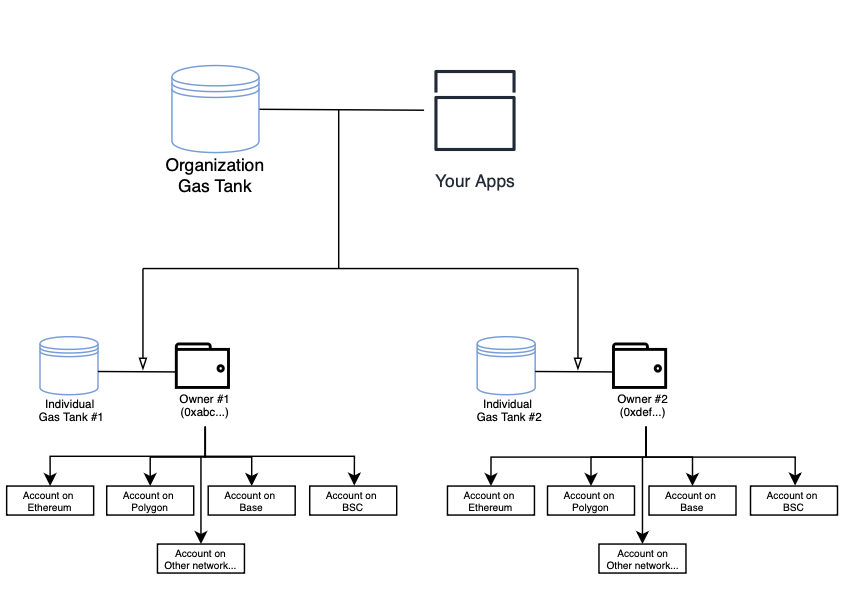Concepts

Owner
An Owner represents a unique user or entity, typically identified by a wallet address (e.g., 0xabc...). Each owner controls one or more accounts across multiple networks. Owners are responsible for authorizing all user operations on their accounts, and each owner is associated with a dedicated Individual Gas Tank for gas payments.
An owner can be any entity capable of signing transactions—this includes a standard private key, a Xellar Embedded Wallet, a third-party wallet, or any system that can produce valid cryptographic signatures.
Account
An Account is essentially a smart contract implementation with enhanced logic and functionality, designed to act like an Externally Owned Account (EOA) while offering additional capabilities. Unlike traditional EOAs, which rely on private keys and seed phrases, these smart contract accounts are programmable, enabling advanced features and customization. Users can interact with the account in the same way they would with an EOA wallet—managing crypto assets, NFT assets, signing in with Ethereum, and more—but with added flexibility and security.
Each account is controlled by a single owner, and every operation requires the owner's signature. This ensures that only the owner can authorize transactions. While the account itself is a smart contract, an EOA (owner) is still needed to manage and interact with the account, as it provides the necessary private key for signing operations.
Accounts and Networks:
An owner can have multiple accounts, each deployed on a different supported blockchain network (e.g., Ethereum, Polygon, Base, BSC, etc.). All these accounts are linked to the same owner and share the same Individual Gas Tank for gas payments.
Key Features
- Single-Owner Account: Each account is controlled by one owner, requiring their signature for all transactions.
- Deterministic Address: Same account address across all supported networks, calculated predictably.
- Gas Fee Management: Flexible gas payment through individual or organization gas tanks.
- Organization Management: Centralized dashboard for managing multiple accounts, gas limits, and transaction sponsorship.
Gas Tank
In traditional Externally Owned Accounts (EOAs), transaction fees (gas fees) are paid using the native coin of the blockchain (e.g., ETH on Ethereum). With Xellar's account abstraction, gas fees are paid using a Gas Tank instead. Each user operation is funded either by an individual gas tank or an organization gas tank, providing flexibility and ease of use.
How Gas Tank Works
Before executing any operation, the gas tank must be topped up. This is done by transferring crypto assets to the Xellar Pool Contract, which acts as the central hub for managing gas tanks. Once funded, the gas tank can be used to pay for user operations.
When submitting a user operation, the system deliberately overestimates the required gas fee to account for potential network congestion and gas price spikes. This ensures that operations can be executed successfully even during periods of high network activity. After the transaction is completed and the actual gas cost is known, Xellar automatically refunds any excess gas fees back to the user's gas tank.
For example:
- Estimated gas fee: 100 USDT
- Actual gas used: 80 USDT
- Refund amount: 20 USDT (automatically credited back to gas tank)
This overestimation and refund mechanism helps:
- Ensure transaction success during network congestion
- Protect users from transaction failures due to insufficient gas
- Maintain efficient gas usage by returning unused funds
Gas Tank Types
Individual Gas Tank
Each owner is equipped with its own individual gas tank. By default, all operations are paid using this gas tank. Users can fund their individual gas tanks to ensure seamless execution of transactions without needing to hold native tokens.
Organization Gas Tank
Organizations have the option to create and manage an organization gas tank. This gas tank is used to sponsor user operations for accounts under the organization's management. By funding the organization gas tank, organizations can cover gas fees on behalf of their users, enabling gasless transactions and simplifying the user experience.